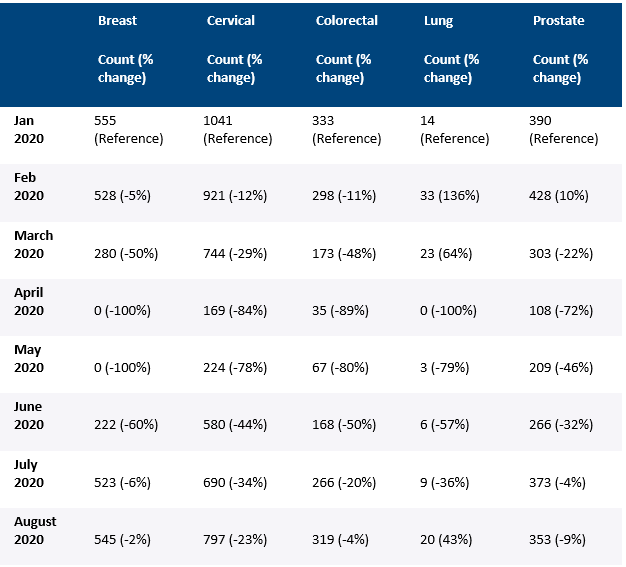
A new study from the University of Illinois Cancer Center assesses the dramatic disruption to cancer screening caused by Covid-19, finding minority patients are among the most affected.
Researchers compared cancer screening counts for breast, cervical, colon, lung and prostate cancer for each month between February and August 2020 to the number of patients screened for those cancers in January 2020. Volume quickly plummeted after January 2020, with the sharpest decline occurring in April 2020.
The team found no patients received breast and lung cancer screenings in April 2020, while screening rates for cervical, colon and prostate cancer declined as much as 89% that month.
There were no differences in screening trends by gender, but disparities in breast cancer screening were found among Black and Hispanic patients. This is particularly concerning because of higher cancer mortality rates experienced by patients of color, said study senior author Shikha Jain, MD, of the University of Illinois Cancer Center.
Screening volume recovered significantly by August 2020, although 23% fewer patients were screened for cervical cancer compared to January 2020.

“The rates of recovery are reassuring, but it’s important to understand that we need a significant increase over pre-pandemic screening rates to catch up with patients who didn’t get tested during lockdown,” Dr. Jain said. “As an oncologist, I am very concerned about a potential flurry of later-stage diagnoses and I encourage primary care physicians to prioritize missed screenings when talking to patients.”
Corresponding author Dr. Mahir Khan shared some additional trends in the data. Breast cancer screening volume in Black patients decreased earlier and recovered more slowly compared to white patients. Yet white patients had poorer cervical screening recovery in August 2020 than Black patients (-60% vs. -23%). Hispanics had poorer recovery of breast screening compared to non-Hispanics by August 2020 (-23% vs. 6%).
“While we expected that cancer screening declined during the pandemic, it was particularly jarring to quantify this reduction. We worry our patients who missed testing may present with more advanced cancers, and I am personally emphasizing screening in the primary care setting,” Khan added.
The abstract, “Trends in cancer screening volumes at an urban health center during the COVID-19 pandemic,” is featured on the American Society of Clinical Oncologists (ASCO) meeting library. The ASCO Annual Meeting will be held virtually June 4-8.
